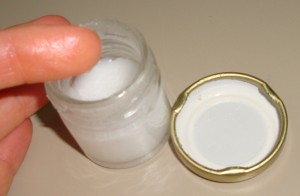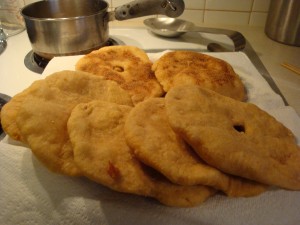 I heard about using coconut oil at a dinner with my healthy eating dinner group. My hostess had mixed it with garlic and herbs and served it instead of butter to put on bread. It doesn't have that buttery flavor, but then, it's not butter.
I heard about using coconut oil at a dinner with my healthy eating dinner group. My hostess had mixed it with garlic and herbs and served it instead of butter to put on bread. It doesn't have that buttery flavor, but then, it's not butter.
I did some research, and though there's always more info out there, I've found that coconut oil is great for a body--both the inside and the outside.
Several months ago, perhaps caused by a hormonal upheaval I was going through, my usual facial moisturizer started irritating my skin. I tried a couple others specially marketed for sensitive skin, and I continued having a red burning rash on my cheek. I had to skip moisturizing, but the dry climate here in Denver really calls for something. Then I heard about coconut oil as a moisturizer, and I tried it. Right out of the bottle on the kitchen shelf. And my rash cleared up quickly. I've put a tiny jar (from a restaurant serving of jam that I took home) of coconut oil in my bathroom cupboard, and I use it on my face regularly now. Much cheaper than any lotions I've bought.

My allergy prone child has dry skin, and I started using coconut oil as her after bath moisturizer. She likes it better than lotion because it doesn't go on cold (she always hated the cold lotion after a warm bath, whereas the coconut oil melts in your hands as you apply it). Also, should there be any little scrapes that lotion would sting, the coconut oil is painless and actually aids the healing process as it is anti-bacterial.
It's also great on hair. I smoothed a little on, left it in for maybe an hour then washed it out. It didn't leave any greasy effect, but I could feel the benefits for several washes and have done it on some mornings when my hair can look greasy for an hour before showering.
Some dietary benefits: coconut oil doesn't create trans fats even at high heat (though it has more nutrition the less it's heated). It nourishes the thyroid, increases metabolism, and promotes weight loss (especially when replacing less healthy fats). It helps regulate blood sugar, is alkaline, and prevents heart disease. It's not hydrogenated, even though it is solid below 75 degrees and looks similar to shortening, and is shelf stable without going rancid for 2-3 years. In recipes, you can replace butter, etc. with half as much coconut oil.
I tried using it instead of butter or margarine to make oven pancakes (out of my trusty Better Homes and Garden cook book, though called "Puffed Oven Pancakes" there). The taste was slightly different, but no one complained.
Since I can't find the same recipe on the Better Homes and Garden site (my cook book is rather old now), I'll just type it up myself, though that means you'll get my own version of the instructions and ingredients. In fact, I think I've merged it from three other recipes and methods, so I'll figure that all out and post it an upcoming Monday. Search for oven pancakes.
I have used it in pie crust, which works but had a little bit of an odd flavor (this may depend a lot on the brand), and I pressed the dough into the pie dish, rather than rolling it out. This saved time, but wasn't decorative.
I've also made graham cracker crust with it. It was a little crumbly, but good.
I almost never fry food, but we had two whole days of rain this past week, and I had picked up a craving for tortas fritas (a.k.a. sopapillas, Navajo fry bread) when it rains while I was living in Uruguay as a young adult. So I tried frying up a batch for when the kids came home from school through the rain (ah, makes me sound like a good mom, right?) I still have a hard time considering something fried healthy, but according to the claims I've read about coconut oil, apparently it was. (Of course I used whole wheat flour!) It feels less greasy than other oils.

Clink on the links below to find more info on coconut oil:





Pingback: Coconut Oil Follow Up–includes chocolate so read on | Five Real Moms
Pingback: Oven Pancakes using Coconut Oil | Five Real Moms